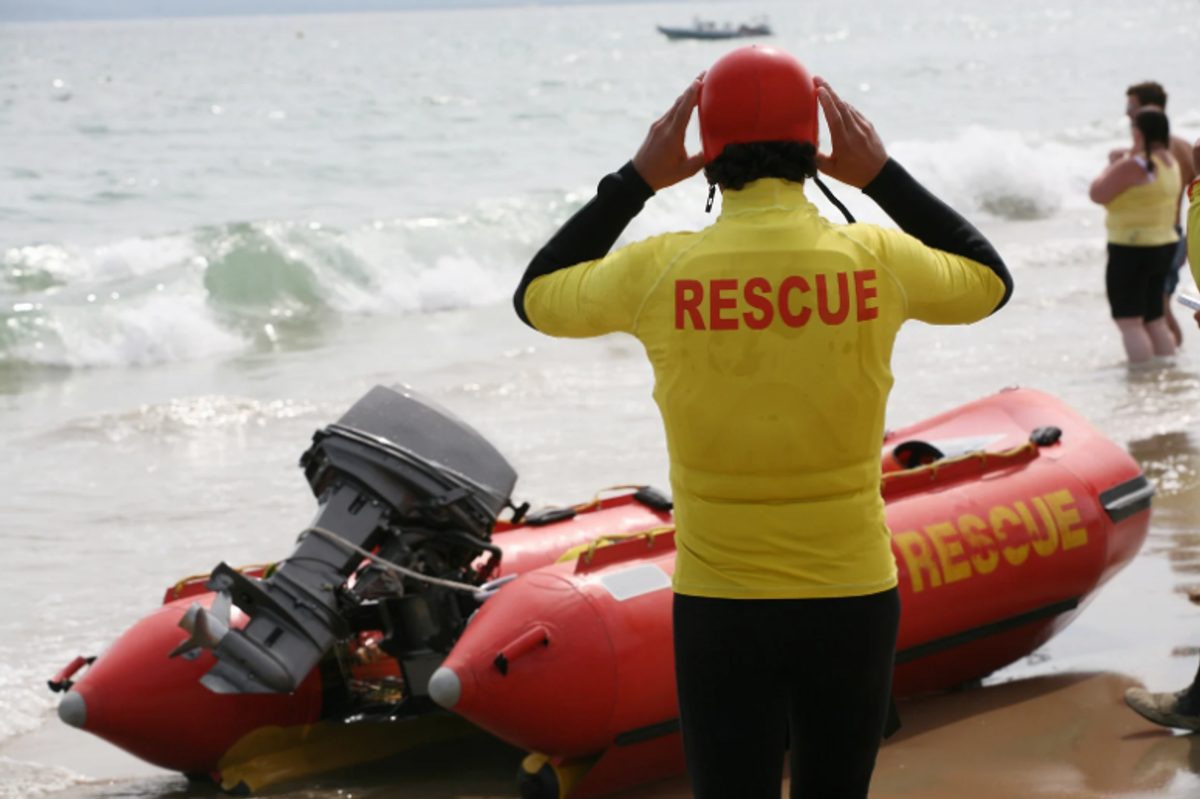Brave 13-year-old swam 2.5 miles to shore, battling 4 hours to save his family swept out to sea
"I don't think I am a hero—I just did what I did."
Rescue team on the shore.
A family in Australia is hailing their 13-year-old son as a hero after he saved their lives following a kayaking and paddleboarding expedition that saw them quickly drift miles off shore. Austin Appelbee bravely left his family (mother Joanne, brother Beau and sister Grace) floating in the waters of Western Australia on Friday, Jan. 30 to seek help in. The nearest land was almost four miles away.
"The wind picked up and it went from there," Joanne Appelbee told BBC News. "We lost oars, and we drifted out further.... It kind of all went wrong very, very quickly."
With every moment dragging the family further into the ocean, Joanne had to make a gut-wrenching decision: to ask Austin to attempt to swim ashore for help, knowing he may not survive.
- YouTube www.youtube.com
A mother's gut-wrenching decision
With conditions worsening and daylight fading, Joanne had to make one of the most difficult choices of her life.
"One of the hardest decisions I ever had to make was to say to Austin, 'Try to get to shore and get some help, this could get really serious really quickly,'" she told the ABC News. "I knew he was the strongest and he could do it. I would have never went because I wouldn't have left the kids at sea, so I had to send somebody."
According to a statement from the WA Police Force, Austin "alerted authorities after he decided to return to shore in fading light and rough conditions. He paddled a short distance before his kayak took on water and swam approximately four kilometers (about two nautical miles) before reaching land."
Naturaliste Marine Rescue commander Paul Bresland added that Austin swam for the first two hours with a life jacket on, calling his swimming "superhuman." "And the brave fella thought he's not going to make it with a life jacket on, so he ditched it, and he swam the next two hours without a life jacket," he explained to ABC News.
- YouTube www.youtube.com
The family had been stranded at sea for 10 hours when a rescue helicopter spotted Joanne and her two children clinging to a paddle board 8.5 miles offshore. A "volunteer marine rescue vessel was directed to their location and all three were successfully rescued and returned to shore."
Joanne is also being hailed a hero for tethering herself and her kids to the paddleboard as they floated further and further out. "We kept positive, we were singing, and we were joking and … we were treating it as a bit of a game until the sun started to go down, and that's when it was getting very choppy [with] very big waves," she said. "As the sun went down, I thought something's gone terribly wrong here and my fear was that [Austin] didn't make it. Then, as it got darker, yeah, I thought there was no one coming to save us. It was the end, it was definitely the end."
@cnn A 13-year-boy swam for more than two miles in "rough conditions" to get help for his family who were stranded out at sea. Austin Appelbee told CNN affiliate 9News that he focused on happy things to keep him going. #cnn #australia
Austin Appelbee speaks
Austin shared more about his heroic battle to save his family.
"I started paddling to shore on the kayak … but it kept taking on water and I was fighting rough seas and then I thought I saw something in the water and I was really scared," he shared with ABC News. "I was trying to get the happiest things in my head, and trying to make it through, [and not think of] the bad things that will distract me."
Mentally, he had to keep himself locked in.
"And at this time, you know, the waves are massive, and I have no life jacket on … I just kept thinking 'just keep swimming, just keep swimming," he added. "And then I finally made it to shore, and I hit the bottom of the beach, and I just collapsed."
However, the physical challenge was not over. Once he made it to land, Austin had to run two kilometers (about 1.25 miles) to the family's parked car to call authorities on his mom's cell phone.
"I said, 'I need helicopters, I need planes, I need boats, my family's out at sea.' I was very calm about it," he said, adding that "nice ladies on the beach" were able to offer him food before he "just passed out."
Days later, Austin was using crutches to help him walk on incredibly sore legs. Despite the physical exertion and trauma, he remained humble about the ordeal.
"I don't think I am a hero—I just did what I did," he told BBC News.

